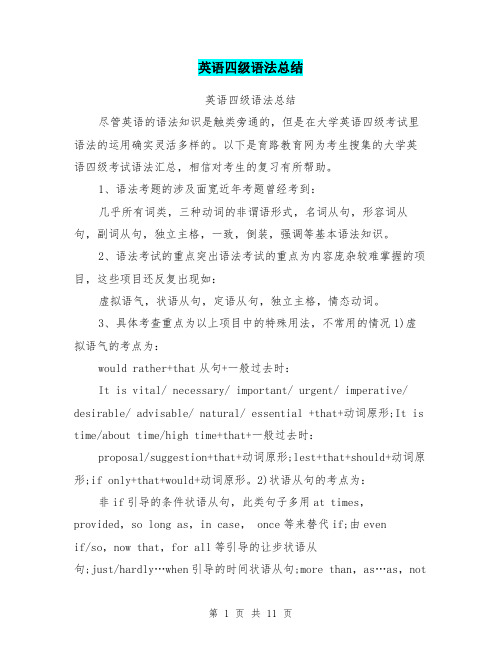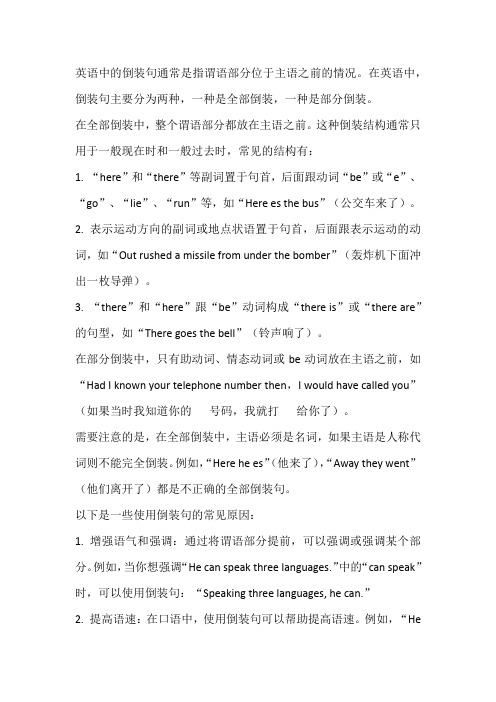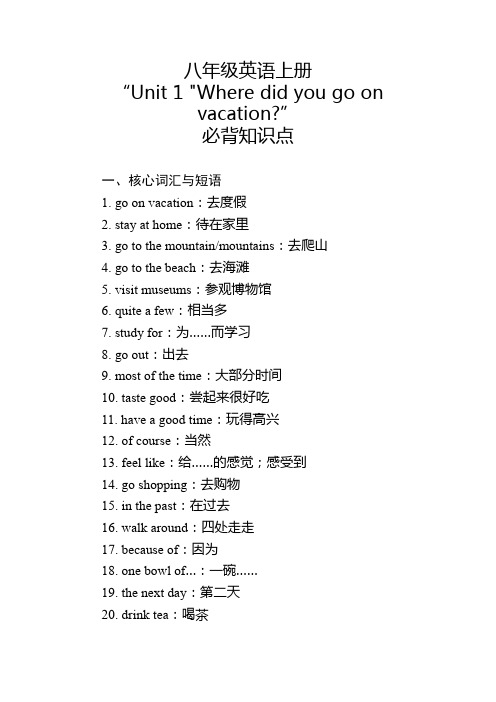Go 的习惯用法
八年级英语上册“Unit 2”必背知识点

八年级英语上册Unit 2 How often do you exercie?必背知识点一、词汇短语1. help with housework:帮助做家务2. go shopping:购物3. on weekends/at weekends:在周末4. how often:多久一次5. hardly ever:几乎不6. once a week/month:每周/月一次7. twice a week/month:每周/月两次8. go to the movies:去看电影9. every day:每天10. use the internet:上网/用网11. be free:有空12. have dance and piano lessons:上舞蹈和钢琴课13. swing dance:摇摆舞14. play tennis:打网球15. stay up late:熬夜16. at least:至少17. go to bed early:早睡18. play sports:锻炼身体19. be good for:对……有好处20. go camping:去野营21. in one’s free time:在某人的空闲时间22. not…at all:根本不23. the most popular:最流行24. such as:例如25. go to the dentist:去看牙医26. old habits die hard:旧习惯难改27. less than:少于/不到二、语法结构1. 频率副词:always, usually, often, sometimes, never 等,用于描述动作发生的频率。
2. “次数”的表达方法:一次once,两次twice,三次或三次以上用基数词+times,如three times,five times。
3. how often 引导的特殊疑问句:用于询问动作发生的频率,回答常含有频率词组或短语。
Unit 4 习惯用法语法

你想要某物/做某事吗?
Would you like to have a try?
You could dosth.
你可以做某事。
You could write to her.
2、常用答语:
肯
定
答
语
Good idea! / That’s a good idea! / OK. / All right. / Great.
Unit 4习惯用法语法
一、习惯用法:
1.allowsb. to dosth.允许某人做某事
2.Whydon’t you dosth.?你为什么不做某事呢?
3.wantto dosth.想要做某事
4.wantsb.to dosth.想要某人做某事
5.letsb. dosth.让某人做某事
6.mindsbdoingsth.介意某人做某事
14. It’s +adj(形容词)+to dosth.做某事是…的。
二.语法讲解:
(一)Why don’t you…?等提建议的句型及常用答语
1、常用提建议的表达:
句型
意义
例句
Why don’t you dosth.?
= Why not dosth.?
你为什么不做某事呢?
Why don’t you talk to your parents?
7.findsbdoingsth.发现某人在做某事
8.refuseto dosth.拒绝做某事
9.offerto dosth.主动提出做某事
10.tellsb.to dosth.告诉某人做某事
11.not…until…直到…才…
英语四级语法总结

英语四级语法总结英语四级语法总结尽管英语的语法知识是触类旁通的,但是在大学英语四级考试里语法的运用确实灵活多样的。
以下是育路教育网为考生搜集的大学英语四级考试语法汇总,相信对考生的复习有所帮助。
1、语法考题的涉及面宽近年考题曾经考到:几乎所有词类,三种动词的非谓语形式,名词从句,形容词从句,副词从句,独立主格,一致,倒装,强调等基本语法知识。
2、语法考试的重点突出语法考试的重点为内容庞杂较难掌握的项目,这些项目还反复出现如:虚拟语气,状语从句,定语从句,独立主格,情态动词。
3、具体考查重点为以上项目中的特殊用法,不常用的情况1)虚拟语气的考点为:would rather+that从句+一般过去时:It is vital/ necessary/ important/ urgent/ imperative/ desirable/ advisable/ natural/ essential +that+动词原形;It is time/about time/high time+that+一般过去时:proposal/suggestion+that+动词原形;lest+that+should+动词原形;if only+that+would+动词原形。
2)状语从句的考点为:非if引导的条件状语从句,此类句子多用at times,provided,so long as,in case, once等来替代if;由evenif/so,now that,for all等引导的让步状语从句;just/hardly…when引导的时间状语从句;more than,as…as,notso much as,the same as,as much as等引导的比较状语从句。
3)独立主格结构多以逻辑主语+分词的形式出现。
4)情态动词多与完成时形式连用。
5)定语从句重点考查介词+关系代词(which)和as作为关系代词。
4、词汇的考查重点为1)动词,名词与介词的搭配如:popular/patient+with;yield/solution/adapt/transfer/access +to;accuse/require+of;charge+for;under+discussion等等。
新概念英语第二册倒装句

英语中的倒装句通常是指谓语部分位于主语之前的情况。
在英语中,倒装句主要分为两种,一种是全部倒装,一种是部分倒装。
在全部倒装中,整个谓语部分都放在主语之前。
这种倒装结构通常只用于一般现在时和一般过去时,常见的结构有:1. “here”和“there”等副词置于句首,后面跟动词“be”或“e”、“go”、“lie”、“run”等,如“Here es the bus”(公交车来了)。
2. 表示运动方向的副词或地点状语置于句首,后面跟表示运动的动词,如“Out rushed a missile from under the bomber”(轰炸机下面冲出一枚导弹)。
3. “there”和“here”跟“be”动词构成“there is”或“there are”的句型,如“There goes the bell”(铃声响了)。
在部分倒装中,只有助动词、情态动词或be动词放在主语之前,如“Had I known your telephone number then,I would have called you”(如果当时我知道你的号码,我就打给你了)。
需要注意的是,在全部倒装中,主语必须是名词,如果主语是人称代词则不能完全倒装。
例如,“Here he es”(他来了),“Away they went”(他们离开了)都是不正确的全部倒装句。
以下是一些使用倒装句的常见原因:1. 增强语气和强调:通过将谓语部分提前,可以强调或强调某个部分。
例如,当你想强调“He can speak three languages.”中的“can speak”时,可以使用倒装句:“Speaking three languages, he can.”2. 提高语速:在口语中,使用倒装句可以帮助提高语速。
例如,“Hewill fly to New York.”可以说成“Will he fly to New York?”3. 引入背景信息:使用倒装句可以帮助引出背景信息,从而使读者更容易理解句子的内容。
八年级英语上册“Unit 1”必背知识点

八年级英语上册“Unit 1 "Where did you go onvacation?”必背知识点一、核心词汇与短语1. go on vacation:去度假2. stay at home:待在家里3. go to the mountain/mountains:去爬山4. go to the beach:去海滩5. visit museums:参观博物馆6. quite a few:相当多7. study for:为……而学习8. go out:出去9. most of the time:大部分时间10. taste good:尝起来很好吃11. have a good time:玩得高兴12. of course:当然13. feel like:给……的感觉;感受到14. go shopping:去购物15. in the past:在过去16. walk around:四处走走17. because of:因为18. one bowl of…:一碗……19. the next day:第二天20. drink tea:喝茶21. find out:找出;查明22. take photos:照相23. something important:重要的事二、重点句型与结构1. 询问过去的行动:Where did you go on vacation? 你假期去哪里了?What did you do last weekend? 上周末你做了什么?2. 回答过去的行动:I went to the mountains. 我去爬山了。
We visited the museum. 我们参观了博物馆。
3. 描述过去的感受或状态:It was wonderful. 太棒了。
I felt like I was a bird. 我感觉自己像一只鸟。
4. 表示过去的频率或习惯:I usually went shopping with my mom. 我通常和我妈妈一起去购物。
人教版英语八年级上册第二单元短语语法知识点总结

Unit 2 How often do you exercise?一、词组、短语:01、help with housework 帮助做家务活,02、go shopping 购物,03、on weekends 在周末,04、how often 多久一次,05、hardly ever几乎不,06、once a week 每周一次,07、twice a month每月二次,08、go to the movies去看电影,09、every day 每天,10、use the Internet上网/用网,11、be free有空,12、have dance and piano lessons 上舞蹈钢琴课,13、swing dance摇摆舞14、play tennis 打网球,15、stay up late熬夜,16、at least至少,17、go to bed early 早睡,18、play sports 锻炼身体,19、be good for 对…有好处,20、go camping去野营,21、in one’s free time 在某人的空闲时间,22、not….at all 根本不,23、the most popular 最流行,24、such as例如,25、go to the dentist去看牙医,26、more than 超过/多于,27、Old habits die hard。
旧习惯难改。
28、hard=difficult 困难的,29、less than 少于/不到二、重要句子(语法):What do you usually do on weekends?你周末通常做什么? I always exercise.总是锻炼身体。
What do they do on weekends?他们周末干什么? They often help with housework.他们经常帮助干家务活. What does she do on weekends?她周末干什么?She sometimes goes shopping。
Unit 10 If you go to the party, you’ll have a great time知识点整理
Unit 10 If you go to the party, you’ll have a great time知识点整理Unit10Ifyougototheparty,you’llhaveagreattime知识点整理一、词组、短语:1、gototheparty参加晚会,2、haveagreat/goodtime玩的开心,3、stayathome,呆在家,4、takethebus乘公交车,5、tomorrownight明天晚上,6、haveaclassparty开班级晚会,7、haveaclassmeeting开班会,8、halftheclass全班一半人,9、makesomefood做食物,10、attheparty在晚会上,11、orderfood预定食物,12、potatochips薯条,13、beangrywithsb.对某人生气,14、givesbsomeadvice给某人建议/劝告,15、travelaroundtheworld周游世界,16、gotocollege上大学,17、make(alotof)money挣钱/赚钱18、getaneducation上学/受教育,19、workhard努力工作/努力学习,20、asoccerplayer一个足球运动员,21、keep…tooneself把…留给自己/独处/避免与人交往,22、talktosb.与某人谈话,23、inlife在一生中,24、intheend在最后,25、beangryat/aboutsth因某事而生气,26、makemistakes弄错/出差错,27、inthefuture在将来,28、runaway逃跑,29、thefirststep第一步,30、inhalf成半,31、solveaproblem解决难题,32、schoolclean-up学校大扫除二、习惯用法、搭配、asksb.todosth请某人做某事,2、givesbsth.给某人某物,3、tellsb.todosth告诉某人做某事,4、too…todosth太…不能做某事,5、beafraidtodosth.害怕做某事,6、advisesbtodosth劝说某人做某事,7、It’sbesttodosth.做某事最好。
冠词(Article)
make an effect 努力
make a living 谋生
make a mistake 犯错误 make a speech做演讲
make an apology 道歉
pay a visit 拜访
keep an eye on 照看 have a meeting 开会
零冠词( Zero Article )
定冠词用法(the)
顺口溜
世界独一二次见,特指方位加地点; 沙漠河流与群山,岛屿海峡和海湾; 专有朝代最高级,会议条约及报刊; 阶级党派国家名,组织团体和机关; 时间乐器建筑类,年代姓氏复数前; 抽象类别涵义时,定冠词the都不删。
• 1.世界独一二次见。 在世界上独一无二的名词前,要用定冠词。二次 见指的是上文提到过的或谈话双方都明的人或物
E.g.: the sea, the sky, the moon.
Is this the book that you are looking for? 这就是你正找的书吗?
• 2.特指专有加地点。 特指:特指某些人或某些物,这是定冠词的基本 用法;
E.g.: Beijing is the capital of China. 北京市中国的首都 方位加地点:用于表示具体的地点、方位 E.g.: We have friend all over the world. 我们的朋友 遍及天下
不定冠词的习惯用法
① 与时间或方式有关的短语构成搭配。
a moment ago 一会儿前 in a moment 立刻
twice a week每周两 次 half an hour 半小时后
a day or two ago 一两天前 once a while 偶尔
after a time一段时动词构成搭配
go的用法
go的用法
go的基本意思是“离开原来的地方向别处挪动”。
用作不及物动词时,常可接带to的动词不定式。
用作名词时,有精力,活力等含义。
1.go的基本意思是“离开原来的地方向别处挪动”。
引申可表示“去,走,旅行,前进”“离开,离去”“死,垮,坏”“放弃,消失,停止存在”“处于…状态”“流行,流传,
流通”“发生,进展,变成,变为”“运行,运转,起作用,走动”等含义。
2.go常用于“be going to+动词原形”结构,可以用于表示时间,即“将要做某事”;也可以用于表示意志,即“打算做某事”“准备做某事”。
表示“打算做某事”“准备做某事”时多用于人称结构,用于被动语态时则可用于非人称结构,表示情况的必然或或然等。
be going to所表示的意图往往是未达到的。
I was going to see you yesterday, but it rained.
我本打算昨天去看你,可是下雨了。
3.“not going to”的含义因主语不同而有异。
当主语是第一人称时意为“主语不愿做某事”; 当主语是第二或第三人称时则意为“说话人不许主语做某事”或“说话人认为主语无权做某事”。
4.go to后常接不带冠词的名词,表示去进行一种活动,而不表示去什么地方。
例如:go to school上学是习惯用法。
感谢您的阅读,祝您生活愉快。
go英语语法
go英语语法"go" 作为动词时,有多种用法,下面列举几个常见的用法:1. 表示“去”:这个用法最为常见,表示离开当前的位置去往其他地方。
例如:- I am going to the store. (我要去商店。
)- She is going to visit her family this weekend. (她这个周末要去看望家人。
)2. 表示“发生”:这个用法表示某件事情正在发生,或者即将发生。
例如:- The storm is going to hit the coast tonight. (暴风雨今晚将袭击海岸线。
)- He is going to propose to his girlfriend tomorrow. (他明天要向女友求婚。
)3. 表示“进展”:这个用法表示某件事情正在进行,或者已经完成。
例如:- The project is going well so far. (到目前为止,项目进展顺利。
)- We have gone through all the data and found no errors. (我们已经浏览了所有数据,没有发现任何错误。
)4. 表示“成为”:这个用法表示某人或某物变成了另一种状态或形式。
例如:- He went from being a teacher to a writer. (他从教师变成了作家。
)- The company went public last year. (该公司去年上市了。
)需要注意的是,“go” 还有其他用法,如作为介词、动词原形等,用法较为复杂,需要根据具体语境来确定其意义。
- 1、下载文档前请自行甄别文档内容的完整性,平台不提供额外的编辑、内容补充、找答案等附加服务。
- 2、"仅部分预览"的文档,不可在线预览部分如存在完整性等问题,可反馈申请退款(可完整预览的文档不适用该条件!)。
- 3、如文档侵犯您的权益,请联系客服反馈,我们会尽快为您处理(人工客服工作时间:9:00-18:30)。
Go about着手做,处理,四处走动,Could you please inform me how to go about contacting a lawyer?请您告诉我怎样联络律师?Let’s go about our business.咱们来干自己的事吧。
Despite the threat or war , people go about their work as usual.尽管战争一触即发,人们仍像平时一样工作。
If your friend comes here with any more criticism about how we bring the children up , I’ll tell him to go abouthis business.如果你朋友再来指手画脚,教育我们如何教育子女,那我就要叫他别多管闲事。
Go ahead开始,前进,领先,请便Go ahead !去吧!(或,说吧!)Food and fodder should go ahead of troops and horses.兵马未动,粮草先行。
Go ahead and do what you like.去吧,喜欢干什么就干什么。
We feel you should go ahead.我们觉得您应该干。
You go ahead and I am coming.你先走一步,我就来。
Go ahead在口语中有大量的应用,根据对话内容或语境一般可译为:说吧,做吧,开始吧,进行吧,继续吧,继续说,继续做,先请,先走一步等等。
例如:May I start? Yes ,go ahead.我可以开始了吗?好,开始吧。
Will you do me a favour? Go ahead.请你帮个忙好吗?说吧。
Do you mind if I smoke? No,go ahead.你不介意我抽烟吧?不介意,你抽吧。
Can I borrow your dictionary? Yes ,go ahead.我可以借你的词典吗?可以,拿去吧。
Go ahead, we’re all listening.继续讲吧,我们都在听着呢。
Go ahead, what are you waiting for?往前走呀,你在等什么?You go ahead and tell him that we’re coming.你先走一步,告诉他我们就来。
You go ahead . I’ll join you soon.你们先开始,我一会就来。
Go ahead, please.你先请(劝别人先吃或先走等的客套话)Go along前进,进行we can’t go along that road because the sign says ‘No Entry’.我们不能走那条路,因为牌子上写着“禁止入内”。
You’ll find the work easier as you go along.在进行过程中,你会发现这工作容易做起来。
Go along with陪同前往,赞同,同意I can’t go along with you on that point.在那一点上我无法同意你的意见。
I don’t go along with her views on nuclear disarmament.我不同意她在核裁军问题上的看法。
I’d go along with you there.要这点上我同意你。
We will go along with your suggestion.我们将同意你的建议。
I can’t go along with your suggestion.我不赞同你的提议。
Go away离开,走掉,走开Go away!走开!To go away without telling your father is most irregular.不跟你父亲打个招呼就走是非常不合适的。
It made me sad to hear you have to go away.听到你非走不可,我觉得很伤心。
I wish he’d go away ; I can’t stand the sight of him.我希望他离开,我讨厌这个家伙。
Don’t go away yet .暂时不离开。
Before I go away I will call round to say goodbye to you.在我离开以前,我要来看你们,向你们告别。
Go by (时间)过去,经过,走过,依照,遵照He let a week go by before answering the letter.他一周以后才回信。
It’s not always wise to go by appearances.根据表面现象看问题有时是不可取的。
Have we enough evidence to go by?我们有足够的证据以资判断吗?Go after追逐,追求What are you going after?你在追求什么?I’ve decided to go after that job in Ohio.我决定力争得到俄亥俄州的那份工作。
He is going after that pretty girl.他在追求那个漂亮的女孩子。
Go on继续,往前走,发生Let us go on to the nest item on the agenda.让我们继续讨论议程上的下一个项目。
Go on this street till you see the cinema.沿街往前走直到你看见电影院。
Suddenly all the lights went on. .突然所有的灯都亮了。
She hesitated for a moment, and then went on .她迟疑了一下,然后接着说。
Are you alive to what is going on?你觉察到正在发生的事吗?Go on有时根据语境不同,而有不同的意思。
可译作:继续做吧,继续说,说吧,去吧,来吧,做吧,得了吧等等。
例如:Oh, go on , I’m not that good .哦,你得了吧,我没那么好。
Go on! you don’t lood a day over thirty.你得了吧,你看起来至多三十岁。
Go on,Mary, go and take one.去吧,玛丽,去拿一块。
Go on, I don’t want to interrupt.往下说吧,我不想打断你。
Go for去找,努力获取,被认为,主张,拥护,攻击,冲向,去做…Where did you go for your vacation?去哪里度假了?He used to go for long walks on the moors.他过去时常在荒野上长时间地散步。
We shan’t let our house go forless than 50000.我们的房子低于50000英镑不卖。
Where can I go for help?我该怎么办呢?The children always lag behind when we go for a walk.我们出去散步时,孩子们总是落在后面。
Go in for赞成,参加,从事,爱好,应试,酷爱,嗜好I don’t go in for loud popular music.我不喜欢喧闹的流行音乐。
He must have have a magnificient build before his stomach go in for a career of its own.当他的胃还未酷爱其份内的工作(放开量大吃大喝)之前,他一定已经有了副强健的体格。
Most girls do not go in for rough games.大多数女孩子不参加粗野的游戏。
Many people went in for writing , music , dramatics and similar activities.很多人从事绘画、音乐、演剧和其他类似活动。
Go off 爆炸,消失,响起,进行,变质The bomb went off in a crowded street.炸弹在熙来攘往的街道上爆炸了。
Everything went offaccording to plan.一切都按照计划进行。
The thieves ran away when the burglar alarm went off.防盗警报器一响,盗贼立刻逃走了。
Hamlet goes offstage left.哈姆雷特从舞台左侧退下。
Fish soon goes off in this hot weather .这么热的天气里鱼很快会变质。
Go out出去,熄灭,过时,相恋,出局,移居国外,罢工He goes out drinking most evenings.晚上他差不多都到外边喝酒。
The fire has gone out.火已熄灭。
Our daughter went out to Australia ten years ago.我们的女儿十年前出国到澳大利亚去了。
Terry has been going out with Sharon for six weeks.特里和沙伦相恋有六个星期了。
Flared trousers went out years ago.喇叭裤多年前就不时兴了。
Go over检查,重做,复习,越过,转向,受欢迎She went over to the Republicans after their election victory.她转向了取得选举胜利后的共和党。
These actors went over very well with the audience.这些演员深受观众们的欢迎。
She went over the room with a duster.她用抹布把房间擦得乾乾净净。
She’s gone overto a milder brand of cigarettes.她已改吸另一牌子味道较淡的香烟。
She went over her lines before the first night of the play .她在该剧首演前又练习了一次台词。
Let’s just go overthese figures again.我们再检查一下这些数字吧。
Go round足够分配,到处走动,传播Is there enough food to go round ?食物够每人一份吗?There’s a lot of flu going round at the moment.现在流感传播很广。
